 |
 |
 |
 |
|
JANUARY 1945
1 January: The Soviets declared the Communist "Lublin Committee" as Polish government. 6 January: Soviet troops liberated Budapest, freeing over 80,000 Jews. 9 January: U.S. troops invaded the Philippines. 12 January: South of Warsaw the Red Army started its winter offensive. 15 January: The Red Army liberated Krakow. 17 January: The last German troops in Warsaw surrendered to Polish troops. 17 January: The Red Army liberated Czestochowa. 17 January: Chelmno: The site was abandoned because of the approach of the Red Army. 18 January: The SS "evacuated" 66,000 prisoners from Auschwitz. 18 January: The Red Army entered Tarnow. 19 January: The Lodz Ghetto was liberated by the Red Army. 20 January: Auschwitz: Crematories II and III were blown up by the SS. 20 January: Nonaggression treaty between Hungary and the USSR. 23 January: The German Navy started the evacuation of the population of East Prussia via the Baltic Sea. 2-3 million people were saved from the advancing Red Army. 26 January: Auschwitz: Crematory V, "working" as the last of the Auschwitz crematories, was used until this day. It was blown up just before the liberation of Auschwitz. 26 January: Roosevelt asked the Swiss to block food and other economic supplies to Germany. 26 January: Hitler called for “final victory” in a broadcast speech and referred to the employment of “miracle weapons”. 27 January: The Red Army liberated Auschwitz and its remaining 7,600 prisoners. Before liberation about 58,000 prisoners were forced to begin "death marches" to the west due to the approach of the Red Army. 30 January: A Soviet submarine sank the German troop ship "Wilhelm Gustloff" on the Baltic Sea. 9,000 fugitives from East Prussia were drowned. Liberation of Budapest by the Red Army. |
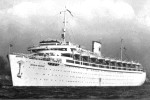 |
|
FEBRUARY 1945
3 February: Heavy U.S. air raid on Berlin. 22.000 people died. 4-11 February: Roosevelt, Churchill, and Stalin met at Jalta (Crimea) to discuss the post-war situation. France was accepted as victorious power. 4 February: German troops retreated from Belgium. 10 February: German troops at Budapest surrendered to the Red Army. 13-14 February: Heavy Allied air raid on Dresden. About 35,000 people died. 19 February: U.S. Marines landed on the island of Iwo Jima (Pacific). |
 |
|
MARCH 1945
7 March: U.S. Army General Patton’s Third Army crossed the Rhine at Remagen, and occupied Köln. 14 March: The German Foreign Minister v. Ribbentrop tried to achieve peace negotiations with the Western Allies about a separate cease-fire. 26 March: U.S. Forces captured the town of Hadamar. In the T4 institute's pharmacy 10 kilograms of "Veronal" and "Luminal" (sleeping pills) were detected, having been used to kill the victims. 30 March: The Red Army occupied Danzig (East Prussia). 31 March: U.S. General Eisenhower stopped his troops on their advance towards Berlin to leave the occupation to the Red Army. |
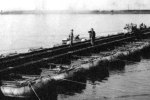 |
|
APRIL 1945
1 April: Battle of Okinawa (Japan), U.S. Marines invaded this Japanese island. 3 April: Himmler ordered the execution of all those who show white capitulation flags on their houses. 11 April: U.S. troops liberated the remaining prisoners at KZ Buchenwald. 12 April: Roosevelt died, succeeded by President Truman. 13 April: The Red Army occupied Wien. 15 April: The SS forced 50,000 prisoners of the KZs Ravensbrück and Sachsenhausen on death-marches towards the West. 15 April: British troops liberated the KZ Bergen-Belsen where 40,000 prisoners were crammed together in unbelievable condition: "both inside and outside the huts was a carpet of dead bodies, human excreta, rags and filth." 16 April: The Red Army crossed the Oder river. 17 April: The last German troops at the Ruhr Pocket surrendered. 20 April: German troops blasted dikes on the Dutch North Sea coast to slow down the Allied advance. 20 April: Herbert Lange was killed in action, during the battle of Berlin. 22 April: The Red Army entered Berlin. 23 April: Hitler dismissed Göring from all duties because he had tried to negotiate with the Allies. 25 April: U.S. troops met Red Army units at Torgau (Germany) on the Elbe river. 25 April: In Milano Mussolini's negotiations with Italian partisan leaders failed. As a result he tried to escape to Germany. 25 April: The San Francisco Conference began. 28 April: Mussolini was captured by partisans, and shot at Giuliano di Mezzegra (Italy). 29 April: Hitler made a will and named Dönitz as his successor. 29 April: Dissolution of the KZ San Sabba in Trieste (Italy). The SS blew up the crematory and its chimney in order to cover up the traces of their crimes. The staff went into hiding. 29 April: The 7th U.S. Army liberated KZ Dachau. 30 April: Hitler committed suicide in the bunker below the Reichskanzlei in Berlin. 30 April: An exile group of the Communist Party of Germany (KPD), led by Ulbricht, arrived in Germany to succeed in getting their political intentions done. 30 April: The KZ Ravensbrück was liberated. |
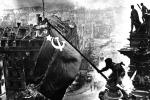 |
|
MAY 1945
1 May: In Hitler's bunker a doctor was ordered to kill Goebbels' 6 children. Then Goebbels and his wife committed suicide. 1 May: On the radio Dönitz proclaimed himself Reichspräsident and called up for continuing the war on the eastern front. 1 May: Soviet units occupied the Reichskanzlei and Hitler's bunker. 2 May: Terezin (Theresienstadt) was taken over by the Red Cross. 2 May: Soviet troops took Berlin. 3 May: British airplanes sank the German passenger ships "Cap Arcona" and "Thielbeck" on which 7,500 KZ prisoners were crammed together by the SS. More than 7,000 people were drowned. Mainly the SS guards were rescued. 3 May: British troops occupied Hamburg. 5 May: The German Wehrmacht surrendered in North Germany and Denmark. The surrender soon to come was broadcasted by the BBC on the evening of 4 May at 20:36. Technically it didn´t come into force before 5 May. 5 May: U.S. troops liberated the KZ Mauthausen (Austria). 6 May: Generaloberst Blaskowitz signed the declaration of surrender of the German Troops in the Netherlands, in the presence of Lieutenant-General Foulkes and prince Bernhard. 7-8 May: Germany surrendered. 9 May: Göring captured by members of the 7th U.S. Army. 9 May: Krüger committed suicide, shooting himself in Liepaja (Liebau / Latvia). 23 May: British troops arrested Dönitz in Flensburg (North Germany). 23 May: Himmler committed suicide in custody, in Lüneburg (Germany). 31 May: Globocnik was arrested by British troops in Carinthia (Austria). He committed suicide the same day by poisoning himself. |
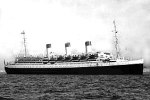 |
|
JUNE 1945
5 June: With the "Berlin Declaration" the Allies took office in Germany. They divided Germany into four occupying zones, according to the former borders of 1937, and Berlin into four sectors. 26 June: Passing of the UN Charter at San Francisco. Although suffering from the war, in June 1945 some inhabitants of Berlin tried to spend their leasure time as usually as possible. |
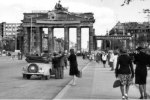 |
|
JULY 1945
1 July: The 3 "Western Sectors" at Berlin were established. 1-4 July: Soviet troops occupied the German states of Sachsen, Thüringen, and Mecklenburg. 4 July: Austria was divided into 4 Allied sectors. 10 July: More than 1,000 U.S. bombers hit Tokyo. 11 July: Start of the four-power administration of Berlin. 16 July: "Trinity” test of the first atomic bomb at Alamogordo, New Mexico. 17 July - 2 August: The "Potsdam Conference": Truman, Churchill (from 28 July: Attlee), and Stalin discussed the politics of the Allies for post-war Germany. 29 July: Japan rejected an Allied ultimatum. |
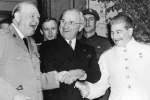 |
|
AUGUST 1945
6 August: A U.S. bomber ("Enola Gay") dropped the first atomic bomb (on Hiroshima). Of a civilian resident population of 250,000 (military personnel not included) it was estimated that 45,000 died on the first day and a further 19,000 during the subsequent four months. 8 August: London Conference about the prosecution of the main war criminals and establishment of an International Military Tribunal at Nürnberg (Germany). 9 August: A U.S. bomber ("Bock's Car") dropped the second atomic bomb (on Nagasaki). Of a civilian resident population of 174,000 (military personnel not included), 22,000 died on the first day and another 17,000 during the subsequent four months. 14 August: Japan surrendered. 27 August: Authorization of democratic political parties in the American zone of occupation. |
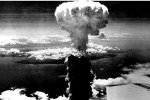 |
|
SEPTEMBER 1945
2 September: End of WW2. Japanese signed surrender terms on board of the "USS Missouri". 3-11 September: Passing of a resolution over land reform in the Soviet Occupation Zone (Germany), resulting in the expropriation of estates exceeding 100 hectares. 10 September: The German Red Cross establishes a missing persons tracing service. 10 September - 2 October: First conference of Allied Foreign Ministers in London. France stipulated the separation of the Ruhr district. The Soviet Union demanded a single central German government, as well as four-power control of the Ruhr district. The U.S. proposed a four-power agreement for the demilitarization of Germany for the next 25 years (the so-called “Byrnes Plan”). 25 September: Start of the dismantling of industrial plants in the 3 Western Zones of Germany. |
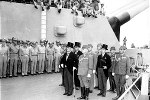 |
|
OCTOBER 1945
2 October: The British launched several assembled German V2 rockets at Altenwalde (Germany) to learn about their function ("Operation Backfire"). The assisting German scientists were finally sent to the U.S. 8-15 October: First Hadamar Trial in Wiesbaden (Germany). 18 October: Opening session (in Berlin) of the International Military Tribunal in Nürnberg (Germany). |
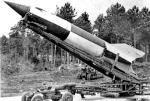 |
|
NOVEMBER 1945
20 November: Start of the Nürnberg Trials (Germany) against 24 main war criminals of the former "Reich". 28 November: First parliamentary elections of the post-war period in Austria. |
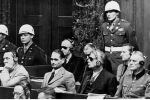 |
|
DECEMBER 1945
13 December: Democratic political parties founded in the French Occupation Zone (Germany). 22 December: Confiscation of German coal mines by the British Military Government in Germany. 23 December: France confiscated the German coal mines in the Saarland. |
 |
© ARC 2006